Thursday Feb 19, 2026
Thursday Feb 19, 2026
Thursday, 28 September 2023 00:20 - - {{hitsCtrl.values.hits}}
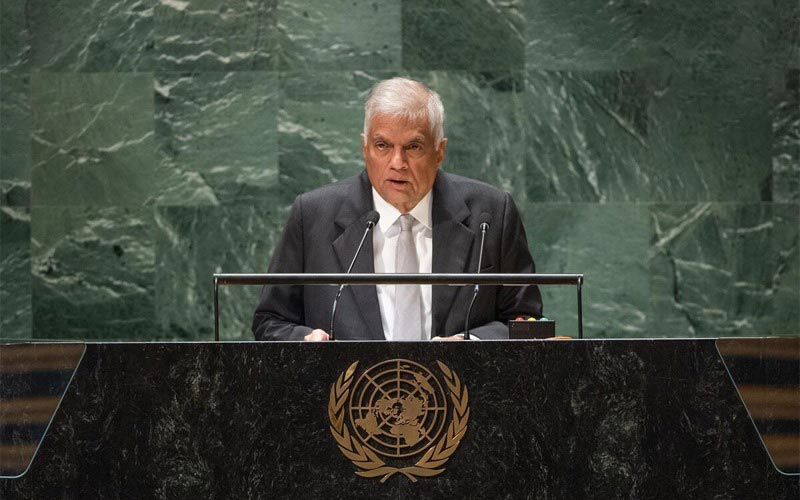
Trashes Aragalaya at UNGA
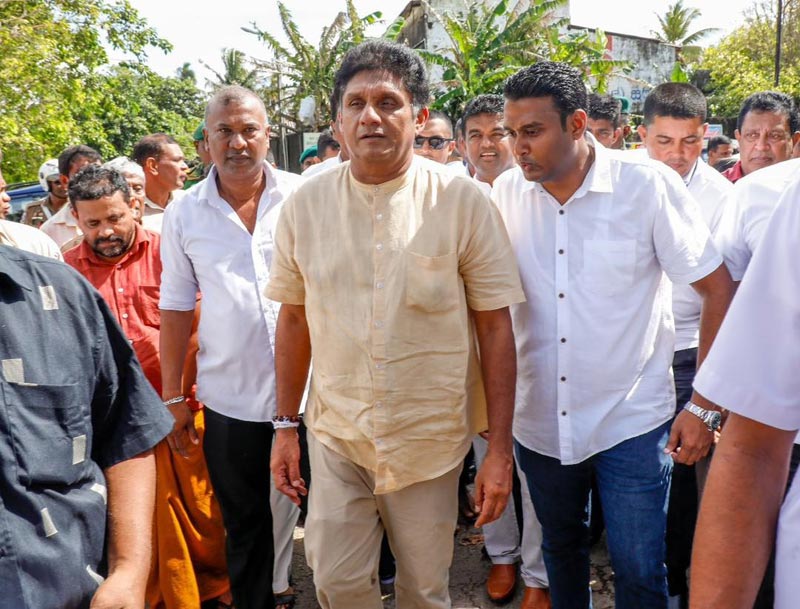
Sajith regains edge
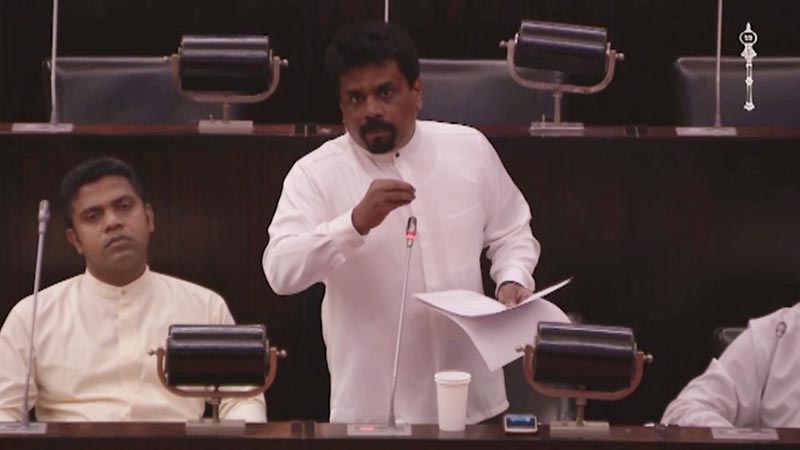
AKD maintains momentum
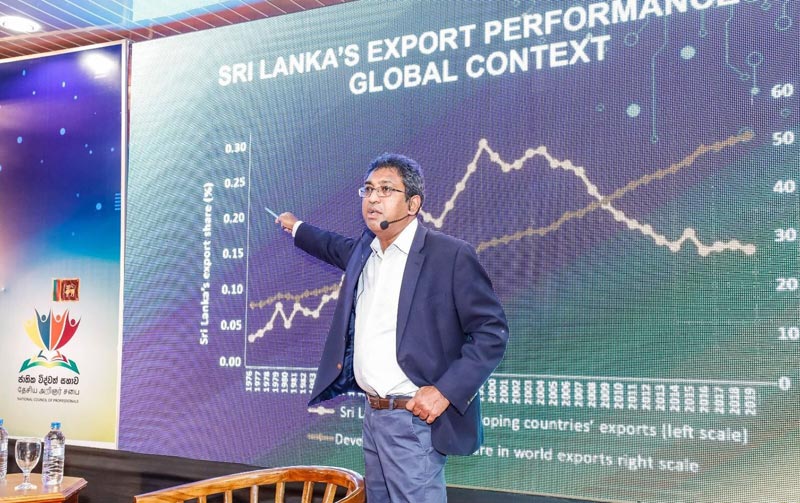
Harsha: Ranilnomics adherent
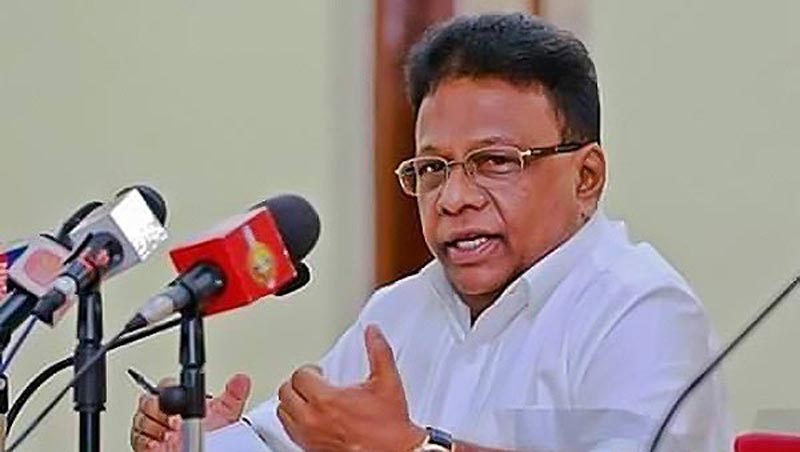
Dullas: PM on Sajith’s ticket?
“Don’t think that the Easter Sunday attack was the last. In the future too there could be more attacks…”
– State Minister for Defence Pramitha Bandara Tennakoon –
 President Ranil Wickremesinghe misused his speech at the UN General Assembly to attack the Aragalaya that liberated Sri Lanka from a racist autocrat and opened the path for him to become President. He falsified contemporary history:
President Ranil Wickremesinghe misused his speech at the UN General Assembly to attack the Aragalaya that liberated Sri Lanka from a racist autocrat and opened the path for him to become President. He falsified contemporary history:
“…Even our Democratic traditions were threatened by attempts to occupy our Parliament and bring it to a halt. Nevertheless, we succeeded in bringing about a democratic political transition, due to our deeply entrenched and resilient democratic traditions.” (presidentsoffice.gov.lk)
Wickremesinghe hypocritically omits to mention his violation of those democratic traditions by refusing to hold local authorities’ and provincial council elections, and even mention next year’s presidential election.
Ranil’s UNGA version not only contradicts what everyone saw and read in the global media but also democratic opinion across the planet which regards the Aragalaya as a heroic, unarmed, democratic, citizens’ uprising; (good) pluralist civic populism which overthrew (bad) autocratic, ultranationalist, militarist populism.
Watch his hands
While silently applauding President Wickremesinghe’s balanced views on world affairs at the Carnegie Institute, I was not convinced. “Never mind what he says, watch his hands”, is a realist adage attributed to John F Kennedy.
 Ranil talks a storm about nonalignment, autonomy and neutrality, but his projected handover of Trincomalee and the Eastern province to India, one of the players in the great power competition, a member of a coalition against another Asian power—China-- makes nonsense of his assertions.
Ranil talks a storm about nonalignment, autonomy and neutrality, but his projected handover of Trincomalee and the Eastern province to India, one of the players in the great power competition, a member of a coalition against another Asian power—China-- makes nonsense of his assertions.
 Such intimate multidimensional dependence on India, establishing contiguity with a giant neighbour, eradicating our island reality and reducing our homeland to an archipelago of a subcontinent, will render us a satellite, a puppet on a string, a pearl pendant on an Indian necklace. So much for Ranil’s ‘pro-Sri Lanka’ affirmation.
Such intimate multidimensional dependence on India, establishing contiguity with a giant neighbour, eradicating our island reality and reducing our homeland to an archipelago of a subcontinent, will render us a satellite, a puppet on a string, a pearl pendant on an Indian necklace. So much for Ranil’s ‘pro-Sri Lanka’ affirmation.
 Ranil’s rule will incorporate us into ‘Akand Bharat’ as a periphery, eliminating our unique linguistic and ‘hydraulic civilisational’ heritage and identity. We shall be unable to choose our direction; determine our destiny. Our de facto capital will be Chennai, power-center of Dravidianism, or Delhi, power-centre of Hindutva, not Colombo.
Ranil’s rule will incorporate us into ‘Akand Bharat’ as a periphery, eliminating our unique linguistic and ‘hydraulic civilisational’ heritage and identity. We shall be unable to choose our direction; determine our destiny. Our de facto capital will be Chennai, power-center of Dravidianism, or Delhi, power-centre of Hindutva, not Colombo.
Congressional crosshairs
With his Anti-Terrorism Act and Online Safety Bill, Ranil is striding into a minefield in the US Congress. There is mounting criticism on Capitol Hill of the Sri Lankan government’s human rights and governance record and current conduct, as reported by the prestigious Foreign Policy magazine (FP).
The caption of the FP Report by Anusha Rathi and Jack Detsch says ‘Congress Wants to Hold Sri Lanka’s Feet to the Fire on Human Rights’ and the strap beneath it reads ‘The United Nations has given the international community the greenlight to punish Sri Lanka for torture. Congress has taken it.’ Extracts follow:
‘Congress is calling on the Biden administration to formally hold Sri Lanka responsible for its human rights abuses and violation of international humanitarian law, including decades of torture, military abuse, and other “horrific crimes” carried out against the country’s minority Tamil population.
In a letter sent to Secretary of State Antony Blinken and obtained by Foreign Policy, 12 members of Congress from both sides of the aisle urged the State Department to follow Article 30 of the United Nations Convention Against Torture and hold Colombo, which has “consistently failed to make tangible progress toward justice and accountability,” responsible.
“In our view, the impunity enjoyed by Sri Lankan perpetrators, which has also enabled Sri Lanka’s economic and political crises, is counter to America’s commitment to upholding human rights and democratic principles and must be stopped,” wrote the lawmakers, led by Rep. Summer Lee (D-Pa.) and Rep. Bill Johnson (R-Ohio), who are calling on the State Department to hold Sri Lanka legally accountable to the U.N. convention on torture.
…Congress is pushing the State Department to hold Sri Lanka to the U.N. torture conventions by opening up formal negotiations under the international statute, but if those measures and arbitration fails, Congress would like to see the Biden administration take the case all the way to the International Court of Justice (ICJ) at the Hague, as Canada and the Netherlands recently did to punish Bashar al-Assad’s brutal dictatorship in Syria.
…The Sri Lankan authorities today continue to stifle activists, journalists, and non-governmental organisations. The country’s northeast region, home to a majority of the Tamil population, remains heavily militarised with residents being forced to flee or give up land. Last summer, the country’s military cracked down on hundreds of peaceful protestors as they demonstrated against the government amid a brutal economic crisis while Sri Lanka battled a food and fuel shortage and inflation skyrocketed to 55 percent.
…Emilia Rowland, the communications director for Rep. Lee, the freshman member of Congress heading up the letter, said a report from the U.N. High Commissioner for Human Rights released earlier this month that called on the international community to pursue accountability for the atrocities spurred U.S. lawmakers into action.
“No alleged Sri Lankan government or military perpetrator has been held responsible for international crimes in or outside Sri Lanka,” Rowland said. “State responsibility for torture can help address the impunity created by the utter lack of domestic and international criminal justice. Canada and the Netherlands recently took Syria to the ICJ. Ultimately, we hope to see the same happen for Sri Lanka.” (Congress Wants To Hold Sri Lanka Accountable For Human Rights Abuses (foreignpolicy.com)
Regarding his Anti-Terrorism and Online Security bills Ranil Wickremesinghe should be asked much the same question that Clint Eastwood posed the injured bank robber groping for his shotgun on the sidewalk, in Dirty Harry: “seeing as” the US Congress, the most powerful legislative body in the world has your administration in its gunsights, “do you feel lucky?”
Shadow State’s political wing
Politics for the next few years has been illumined and inflected by the recent parliamentary debate on the Easter Sunday massacre in the light of the Channel 4 revelations.
The SLPP is now the political wing of the ‘Rogue State’, or ‘Hidden’/’Invisible Government’ as Opposition Leader Sajith Premadasa variously called it, or the ‘Deep State’ as Patali Champika Ranawaka more conventionally classified it. I call it the ‘Shadow State’.
The entire discourse of the SLPP in the parliamentary debate was recognisably from the 2019 Gota campaign. The SLPP is stuck in the Gotabayan time-warp, with talking points provided by ‘handlers’ deployed by the securocracy.
Kanchana Wijesekara declared that many of the SLPP parliamentarians had been opposed to the 52-day interlude of Maithripala Sirisena and Mahinda Rajapaksa in 2018. That was the last gasp of moderate SLFP-type patriotism/nationalism, defeated not only by the courts and the UNP, but also sabotaged by the SLPP parliamentarians who had already lined up with Gotabaya or Basil.
By its uncompromising, unrepentant rhetoric in the Parliamentary debate, the SLPP has quite irretrievably lost the Catholic/Christian vote which Sirimavo won in 1970, CBK in 1994, and Mahinda in 2005 and 2010.
Quite unlike Mahinda, the GR camp had a vicious anti-Catholic/Christian streak. Despite Gota’s assertions in the concluding paragraphs of his response to the latest Channel 4 documentary, of his warm munificence towards the Catholic Church and community during his mercifully short presidency, it was Gotabaya as Secretary/Defence who approved the incarceration of a Catholic nun from India, belonging to the Missionaries of Charity founded by Mother Teresa. She was released only because Mahinda overrode GR when Cardinal Malcolm Ranjith threatened to boycott the Presidential Christmas party.
It was also on Gota’s orders that heavily-armed military moved into Rathupaswela. The Catholic Church in the area was shot into, a civilian who had sought shelter inside murdered (with his skull shattered) and nuns ordered to kneel at gunpoint. The commanding officer was given a DPL appointment by Gotabaya.
In 2024-5 the SLPP starts with huge minus: the Catholic/Christian and Muslim votes. Gotabaya’s cuckoo fertiliser policies and exploding gas-cylinders have already decimated the SLPP in the Sinhala-Buddhist heartland.
Sajith’s moment
In the landmark debate on the Easter massacre the best speeches were by Sajith Premadasa and Anura Kumara Dissanayake. Noticeably better than AKD’s (a high bar), Premadasa’s speech was a Benelli combat shotgun which shredded the credibility of the Government’s entire argument.
Sajith’s performance over the intense two-day debate revealed a persona with focused firepower which if maintained with a consistency lacking so far, could see him elected President next year. However, speeches alone, in parliament or outside, do not a president make, or else we’d have had an Anura Bandaranaike presidency. He was an excellent Opposition Leader and orator.
What will count is how Sajith and the SJB fare, not merely on governance and human rights, but on economic constriction, inequity and ruinous privation-- which should have been home-ground to President Premadasa’s son and paradoxically isn’t so (yet), thanks to his party’s para-Ranil profile on economics.
The upcoming Budget debate, the last before the presidential election, will be a real test of who-- Sajith or Anura-- can produce a discourse which combines the most rational and balanced economic strategy with the greatest public appeal (something that Ranasinghe Premadasa was maestro of). In a shrinking economy, that is the battleground on which elections are won or lost.
Can the centrists win?
The SJB is pulling in two directions rather than following Sajith’s lead, unlike the NPP-JVP which is backing AKD fully. The SJB has to decide whether it is running with Ranil or against him; whether it represents continuity with Ranil’s economic agenda or is the alternative to it.
The NPP-JVP knows its main asset and attraction is Anura, but the SJB has a pretentious faction that obtusely believes its main asset is not its leader Sajith Premadasa, but it’s overhyped economic team. That faction’s ideological inspiration is not President Premadasa, the developmental-political superstar, but Ranil Wickremesinghe and Mangala Samaraweera, the electoral liabilities.
While SWRD’s SLFP severed upon birth its umbilical cord with the great DS Senanayake’s administration he prominently served in, the SJB parades continuity with Ranil’s undistinguished administrations of 2001-2004 and 2015-2019 (“our Government”). Significantly, though led by Sajith Premadasa, the SJB does not trace its roots to the Premadasa presidency and ‘development miracle’.
Meanwhile the public is looking not just to turn the page but throw away the old volume with the Ranil Wickremesinghe and the Rajapaksa chapters. The NPP-JVP surfs that populist zeitgeist while the SJB represents no zeitgeist at all.
While Dr Harsha de Silva springs to the unqualified defence of EPF-ETF slasher Mahinda Siriwardena, he and the SJB economic troika maintain a deafening silence on Indrajit Coomaraswamy’s anti-elections economics lecture.
The SJB confuses its main competitor with its main enemy. The NPP and SJB are each other’s main competitors /rivals, but their main enemy is Ranil because the presidential election is an audition for the most authentic champion of the people who will end their pain and hopelessness soon. This means a fight for the people’s hearts and minds, against the Establishment and the status quo, i.e., the incumbent and his economic sadism.
In Ceylon/Sri Lanka and the world at large, it is never an undivided Right but almost always a Social Democratic or progressive centrism, often as a broad coalition sharply demarcating itself from the polarising Right, that beats a polarising Left.
The secret of centrist electoral success lies not in the antipodal counterposing of liberal-democracy to populism, but in a composite constellation or fusion: liberal democracy, social democracy, populism, patriotism. A populist liberal-democracy/social democracy; a liberal-democratic/social-democratic populism. That’s how Bandaranaike (1956) and Premadasa (1988) won.
A progressive-centrist alternative can defeat the rancid Right (Ranil-UNP-SLPP-Gota party) and the monopolistic (one-party) Left. A Right or Centre-Right substitute cannot.
 Ranasinghe Premadasa didn’t run on anyone else’s policy platform but his own. If Sajith Premadasa runs on Harsha de Silva and the economic troika’s policy platform, it means he represents that economic policy and can be expected to put it into practice.
Ranasinghe Premadasa didn’t run on anyone else’s policy platform but his own. If Sajith Premadasa runs on Harsha de Silva and the economic troika’s policy platform, it means he represents that economic policy and can be expected to put it into practice.
 This means Sajith will forfeit his greatest asset: ‘the Premadasa magic’ and the appeal of an updated, upgraded resumption of the Premadasa model which produced a development miracle.
This means Sajith will forfeit his greatest asset: ‘the Premadasa magic’ and the appeal of an updated, upgraded resumption of the Premadasa model which produced a development miracle.
 Sajith should run on a ticket of himself as President and Dullas Alahapperuma as PM.
Sajith should run on a ticket of himself as President and Dullas Alahapperuma as PM.
 SP and AKD should call for the 2nd preference vote to be given to the other, so that one of them can win, causing a generational shift.
SP and AKD should call for the 2nd preference vote to be given to the other, so that one of them can win, causing a generational shift.
 The national and public interest are best served by a vote for Premadasa’s son, the Opposition and SJB leader, at the presidential election.
The national and public interest are best served by a vote for Premadasa’s son, the Opposition and SJB leader, at the presidential election.
 If the SJB stands for continuity with economic Ranilism including structural Indianisation, the most rational choice is to vote for AKD-JVP-NPP at the parliamentary election, giving Anura the Prime Ministership.
If the SJB stands for continuity with economic Ranilism including structural Indianisation, the most rational choice is to vote for AKD-JVP-NPP at the parliamentary election, giving Anura the Prime Ministership.
 No single party can successfully address the country’s crisis. Either Sajith + Dullas or Sajith + Anura is the power-sharing combination for this extreme situation.
No single party can successfully address the country’s crisis. Either Sajith + Dullas or Sajith + Anura is the power-sharing combination for this extreme situation.
Alternate endgame
In the political multiverse there can be another, bloodier endgame. A sinister moment in the Easter debate was when D. Weerasinghe, a lean, mean, young SLPP MP, declared that “there are reports that those who were in the Aragalaya, burned houses of MPs, murdered them, and marched on Parliament trying to occupy it, are training militarily in remote locations”.
This could herald a ‘false flag’ operation, combined with the ghastly ghosts of the Jayewardene 1980s: the bogus Naxalite Plot and detention in Army custody of Vijaya Kumaratunga before Referendum 1982, and the post-July 1983 frameup of the JVP, which led to its proscription, renewed clandestinity, and massive second insurrection.
Following Indrajit Coomaraswamy, Emeritus Prof. Nimal Sanderatne has argued against Presidential election 2024 and the Parliamentary election. (Upcoming elections may undermine economic reform, stability and growth | Print Edition - The Sunday Times, Sri Lanka).
Experienced Indian Lankanologist and Observer Research Foundation (ORF) analyst N Sathiya Moorthy has critically surfaced the postponement scenario, speculating that the regime’s formula may be ‘bundling’ the presidential and parliamentary elections together on the scheduled deadline for the parliamentary election, 2025-- a year later than the presidential. (Is Govt Afraid Of Voters? | MENAFN.COM)
It is the abortion of the Jaffna DDC election of 1981 and the cancellation of the parliamentary election of early ‘83 by Referendum ‘82, rendering the TULF and parliamentarism irrelevant, that enabled the Tigers to leap to the forefront, eliminating a Sri Lankan army patrol in an ambush and triggering July ‘83 after which it grew exponentially. Referendum ‘82 had the same effect in the South. The moderate Opposition, the SLFP became irrelevant. The JVP rose in hyper-violent insurrection.
Cancelling (zero-funding, ‘postponing’) Presidential election 2024 would turn Ranil, now an illegitimate (no popular mandate) but legal (constitutional) ruler, into an illegitimate and illegal (unconstitutional) dictator, deserving and requiring popular overthrow. A shrinking economy, amply-documented immiseration (relative and absolute), and dictatorial rule, constitute a recipe for revolt, rebellion and revolution.
[This column will be rested next week as the writer will be moderating a panel at the 20th Annual Meeting of the Valdai Discussion Club, Russia. The Valdai 20th anniversary’s theme is ‘Fair Multipolarity: How to Ensure Security and Development for All’.]